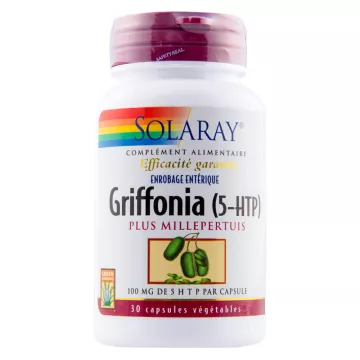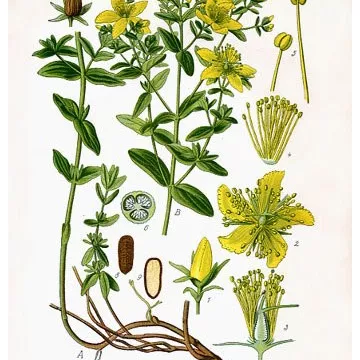When moods darken for no apparent reason, cravings wane or sleep becomes unstable, St. John's Wort can offer invaluable support. At Soin-et-Nature, we've put together an expert selection of food supplements based on St John's Wort, a plant renowned for its serotonin-regulating action. Ideal for temporary sadness, irritability or anxiety-related sleep disorders, this natural remedy acts gently to promote lasting emotional balance, without addiction.
What is St. John's Wort used for in phytotherapy?
St John's Wort's reputation as a vulnerary and healing agent dates back to Antiquity. In the Middle Ages, it became a magical herb used to protect against evil spirits and drive away witches, hence its name "devil's charm". It was also known as St. John's Day grass, blooming at the summer solstice and hung in bunches in front of homes to protect them. In the 19th century, it was the red oil obtained by macerating flowers in olive oil in the sun that provided a cocatrising remedy for burns. At the end of the 20th century, the tincture was recommended in America against mania and hysteria. In the 1980s, the first oral indications as an antidepressant appeared in Germany; today, it is one of the best-selling herbal health products in Europe and the United States as an antidepressant.
St. John's Wort is particularly appreciated in phytotherapy for its natural action on emotional balance, especially when used in conjunction with other natural solutions for stress and sleep.
Latin name: Hypericum perforatum L.
Botanical family: Hypericaceae
Producer organ: Flowering tops harvested in summer.
How does St. John's Wort affect mood?
- Pharmacological activity seems to be attributable to a synergy between naphthodianthrones(hypericin), phloroglucinol derivatives (hyperforin) and various flavonoids
- Kielcorin (xanthone) is thought to be one of the active ingredients.
- St. John's Wort is a source of melatonin (Pr Robert Anton)
- Mechanism of action: St. John's Wort inhibits synaptosomal reuptake of serotonin, dopamine and noradrenaline (norepinephrine) with equal affinity.
- In vitro, it has affinity for adenosine, GABA(A) and (B) and glutamate receptors
- In vivo, it reduces beta-adrenergic activity at its receptors and increases serotonin activity.
How to take St. John's Wort safely?
- Dry extracts in capsules or tablets, containing between 200 and 300 mg per capsule
- Take 600 to 900 mg per day
- To prepare St. John's Wort oil: macerate a handful of St. John's Wort flowers in ¾ liter of olive oil (in a wide-necked container). Leave the bottle closed, in full sunlight, for three weeks: the oil gradually takes on a beautiful red color. Caution: it is photosensitizing. Recognized for its soothing properties, this oil is traditionally used in natural treatments for burns and sunburns, as a complement to other herbal healing products.
Can St. John's Wort interact with other treatments?
- Photosensitizing (by inducing singlet O2 formation)
- Interactions with "low therapeutic margin" drugs, notably anti-retrovirals (anti-HIV drugs such asindinavir), digoxin, theophylline, anti-vitamin K drugs, ciclosporin, oral contraceptives, SRI antidepressants,amitriptyline, cyclosporine, fexofenadine,indinavir, methadone, midazolam, nevirapine, phenprocoumon, simvastatin, tacrolimus and warfarin. These interactions are linked to enzymatic induction of cytochrome P450 and induction of membranair P-glycoprotein.
- Possible reduction in drug effect secondary to a decrease in plasma concentration, following possible induction of CYP2C9, CYP3A4 and CYP1A2, induction of CYP3A activity, with reduced therapeutic efficacy of drugs metabolized by CYP3A, other sources do not find any alteration in CYP2C9, CYP1A2, CYP2D6 activity.
- Interactions with protease and transcriptase inhibitors, immunosuppressants ciclosporin and tacrolimus, irinotecan, imatinib, minidosed hormonal contraceptives, serotonergic antidepressants by induction of cytochrome P450 CYP3A4(hyperforin) and P-glycoprotein(hypericin)
- Abrupt discontinuation of St. John's Wort may therefore also lead to an increase in the plasma concentration of these drugs.
- St. John's Wort induces CYP3A4 activity progressively and powerfully, and the elimination of ethinylestradiol, a major substrate of CYP3A4, will be greatly accelerated in the presence of St. John's Wort, with the result that the contraceptive effect will no longer be assured and an alternative method of contraception will be required
- In 2014, the UK Medicines and Healthcare Products Regulatory Agency (MHRA) issued an alert on the risk of interaction between St. John's wort and progesterone-based hormonal contraceptives, microdose combined pills and etonogestrel implants: 19 suspected interactions were reported between 2000 and 2014, including 15 unwanted pregnancies
- A few cases of serotonin syndrome have been reported in the literature in elderly patients treated with a serotonin reuptake inhibitor antidepressant who have taken St. John's Wort.
What active ingredients make St. John's Wort effective?
- Red pigments of the anthrone group (0.06-0.15%): naphthodianthrones including hypericin (the usual tracer in extracts), pseudohypericin, isopseudohypericin, protopseudohypericin and cyclopseudohypericin
- Phloroglucinol-derived phenolic compounds (2-5%): hyperforin (prenylated derivative), adhyperforin, hydroperoxycadiforin (best candidate for antidepressant effect)
- Flavonoids: hyperoside, isoquercitroside, rutoside, quercetol
- Biflavonoids (0.1-0.5%): biapigenin, amentoflavone (its isomer)
- Xanthones in small quantities: tetrahydroxyxanthone (and kielcorin in roots)
- Tannins and proanthocyanidols
- Essential oil: n-alkanes and monoterpenes
- Melatonin (4490 ng/g)
The flowering tops of St. John's wort, dispensed in pharmacies, have a WHO monograph, an EMA Community monograph and a control monograph in the European Pharmacopoeia. They are listed as medicinal plants in the French Pharmacopoeia.
How can St John's Wort extract help reduce the symptoms of nervous breakdown?
Nervous breakdown is a common disorder that can be difficult to treat. Many patients are looking for natural solutions to reduce their symptoms. St. John's wort extract is a popular remedy for mild to moderate depression. Here are some tips for using St. John's wort extract to reduce symptoms of nervous breakdown:
- Talk to your doctor: Before taking any dietary supplement, it's important to talk to your doctor to find out if it's suitable for your condition and if it may interact with other medications you're taking.
- Use a standardized extract: When you buy St. John's wort extract, make sure it's standardized to 0.3%hypericin. This is the effective dose used in clinical studies.
- Follow dosage instructions: Recommended doses vary, but in general, 300 to 900 milligrams of St. John's wort extract per day is recommended. It's important to follow the dosage instructions on the package or those given by your doctor.
- Be patient: It usually takes 4-6 weeks for St. John's wort extract to start having an effect on the symptoms of depression. So be patient and continue to take St. John's wort extract regularly.
- Do not take other medicines with St. John's wort extract: St. John's wort extract may interact with other medications, including antidepressants, oral contraceptives, anticoagulants, etc. Therefore, it's important not to take any other medication without your doctor's advice.
In summary, St. John's wort extract may be an option for reducing the symptoms of mild to moderate nervous breakdown. However, it's important to talk to your doctor before using it, to use a standardized extract, to follow dosage instructions, to be patient and not to take other medications without medical advice.
Which Stress and Sleep food supplements does Soin-et-Nature offer?
Soin-et-Nature offers a wide range of food supplements to help manage stress and improve sleep quality. Here are the main categories available:
- To restore lasting emotional balance, specific supplements support your psychological well-being.
- To promote restful sleep, natural solutions help you fall asleep better and improve the quality of your nights.
- To regulate the sleep cycle naturally, melatonin is a precious ally against circadian rhythm disorders.
- To reduce the effects of daily stress, suitable supplements promote relaxation and calm.
- To cultivate serenity and well-being, specific formulas support a state of lasting calm and relaxation.
- To enjoy the benefits of Griffonia, this plant rich in 5-HTP promotes a stable mood and quality sleep.
- To naturally relieve symptoms of mild depression, St. John's Wort is an effective natural alternative.
- To boost resistance in the face of stress, Rhodiola is an adaptogenic plant ideal for supporting body and mind.
These dietary supplements available on Soin-et-Nature offer natural solutions for regaining calm and serenity, while promoting quality sleep and lasting emotional well-being.

